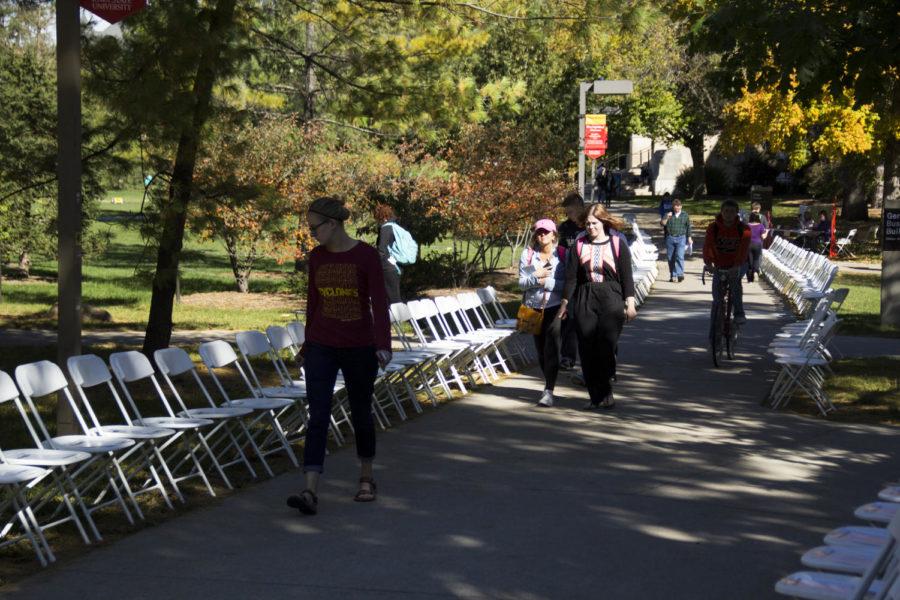Violence leaves an empty chair at dinner tables
October 16, 2014
Nearly 200 empty chairs lined the sidewalk on the lawn of Central Campus, each representing a tragedy that happened within a home in Iowa.
Each of the 197 chairs, leading from the Margaret Sloss House to the Memorial Union, represents every man, woman, and child in Iowa who has lost his or her life to domestic violence since January 1995. Each individual chair has a person’s name, as well as his or her story.
Violence Leaves an Empty Chair at the Table took place from 10:30 a.m. to 1 p.m. Oct 16. The event was sponsored by the Margaret Sloss Women’s Center, Student Counseling Services and the Assault Care Center Extending Shelter and Support in Ames.
The goal of the event is to spread awareness of domestic violence.
Anasia Sturdivant is the Youth Domestic Violence Coordinator at ACCESS and said raising awareness is the best way to help others.
“It helps open people’s eyes,” Sturdivant said. “Just seeing these stories creates an ‘aha’ moment for people where they realize it’s a lot worse than they thought.”
ACCESS wanted to reach out to people in order to teach them about the issue.
“This event is meant to show people that this problem is real and it’s not just something you see in the media,” said LaShawn Wright, a domestic abuse advocate for ACCESS and an ISU alumna. “It’s something that happens in the home, whether it’s your neighbor or even within your own home.”
By informing students on campus about the issue, Wright said it would help make a difference.
“Domestic violence is not something that will stop overnight, but by bringing awareness on campus, we could help change that,” Wright said.
Leah Clark, a graduate student in educational leadership, said she was shocked at the number of chairs there were representing individuals from Iowa.
“It’s definitely caused me to start thinking a lot about this issue,” Clark said. “Reading these stories and thinking about them definitely makes it all seem more real.”
Sturdivant said this passive event is effective in not only making people aware but also gaining their interest.
“After events like this, we get a lot more feedback from people wanting to help out,” Sturdivant said.
The most important part of the event is to offer assistance to those who may be suffering from domestic violence or know someone who is, Sturdivant said.
“We get people who think they know someone in a violent situation and come to us for questions on how to help,” Sturdivant said.
According to Sturdivant, events like this are important to inform others on resources offered by ACCESS and other domestic violence shelters.
If you wish to contact ACCESS about a domestic violence problem, they can either be contacted on their website or by calling one of their crisis lines. The services offered are free and confidential.
Sexual Abuse Crisis Line: 1-800-203-3488
Domestic Violence Crisis Line: 1-855-983-4641
Shelter Services Crisis Line: 1-855-696-2980







